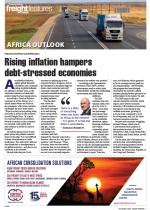The outlook for sub-Saharan Africa in 2023 remains highly uncertain and can at best be described as modest, according to the International Monetary Fund (IMF).Having experienced growth of 4.7% in 2021 expectations are much lower for 2022, which is set to record growth of only 3.6% due to muted investment and the overall worsening of the continent’s balance of trade.According to Abebe Aemro Selassie, director of the IMF ’s A f r ican department, rising inf lation and living costs are becoming more difficult to juggle. “While the recent pickup in inf lation is less striking relative to historical averages for sub-Saharan Africa, the cost-of-living squeeze has pushed millions of people into acute food insecurity and could weigh on economic growth and undermine social and political stability on the continent,” he said.Currently, public debt has reached about 60% of GDP, leaving the region with debt levels last seen in the early 2000s. In this regard, the composition of debt has shifted towards higher-cost private sources, increasing debt service costs and rollover risks. In fact, 19 of the region’s 35 low-income countries are now in debt distress or at high risk of distress, according to the IMF.Selassie highlights four priorities for policymakers in sub-Saharan Africa.“First, in the context of rising food insecurity, the utmost priority must be to protect the most vulnerable. Scarce resources should go to those who need them most. Poorly targeted emergency measures should be gradually phased out,” he says. “Second, to contend with increased inf lation and tightening global interest rates, policymakers should cautiously raise policy rates while keeping a close eye on inf lation expectations and foreign exchange reserves.“Third, policymakers in the region need to continue consolidating their public finances to preserve fiscal sustainability, particularly in the context of rising interest rates. Credible medium-term fiscal frameworks, including effective debt management, can help lower borrowing costs. In countries with acute debt vulnerabilities, debt restructuring or reprofiling may be required, suggesting the need for improved implementation of the G20 Common Framework.“And finally, they should set the stage for high-quality growth, amid accelerating climate change. Investment in resilient, green infrastructure, and capitalising on the region’s sizable renewable-energy resources will require both innovative private finance and energy sector reforms.”According to Selassie, increased international support, including more concessions finance, will be crucial for sub-Saharan Africa.The IMF has been supporting sub-Saharan Africa with close to $50 billion since the beginning of the pandemic. More recently it announced new programmes for Benin, Cabo Verde, Mozambique, Tanzania and Zambia. The IMF Board has also approved a new ‘Food Shock Window’ to support its members suffering from acute food insecurity, a sharp food imports shock, or from a cereals export shock.“We are also helping catalyse new capital inf lows by boosting local capacity and expanding our lending facilities with our new Resilience and Sustainability Trust to provide affordable financing to address longer-term structural challenges.”

